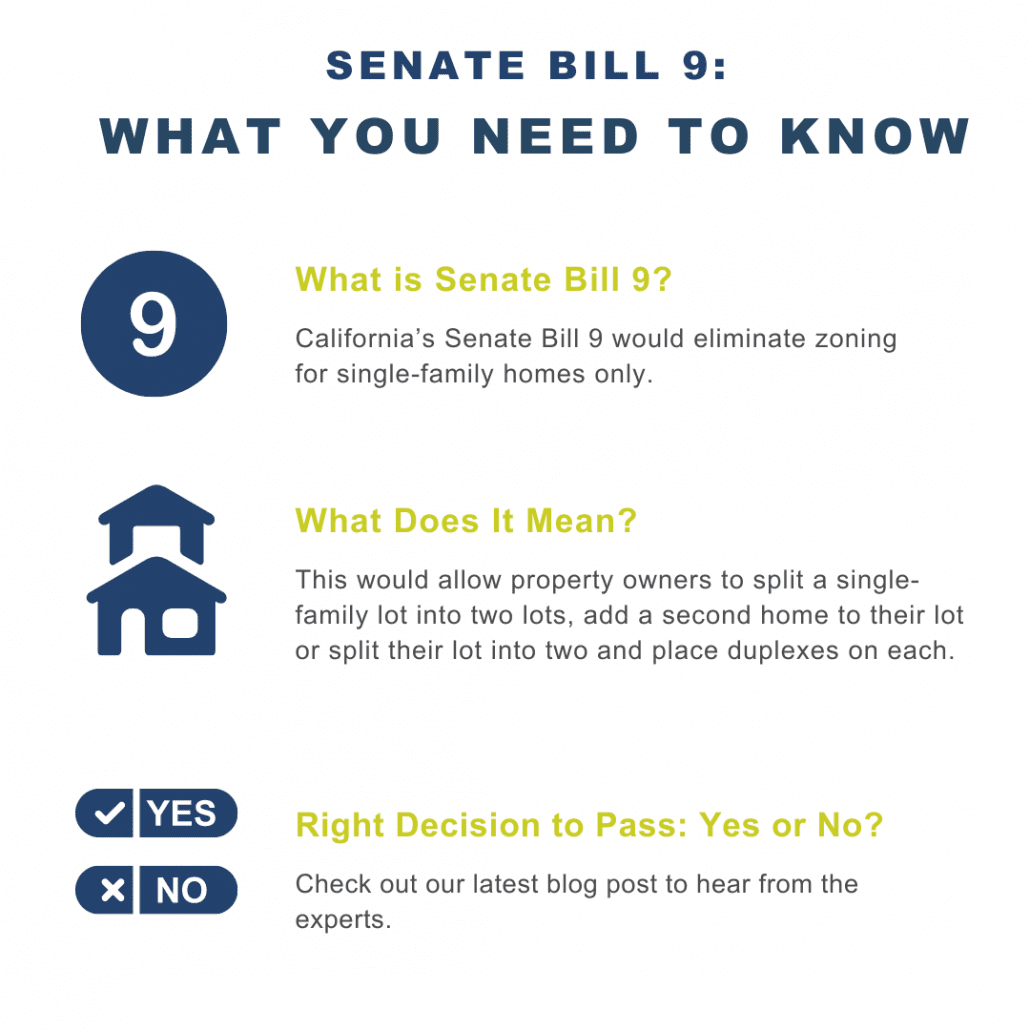What is Senate Bill 9? Should It Have Been Approved?
Reviewing The San Diego Union-Tribune’s “Did Gov. Newsom make the right economic call approving Senate Bill 9?”
Senate bills, proposed tax plans… This time of year, there’s a lot of legislation to keep top of mind—especially for those in the commercial real estate industry. Most recently, California Governor Gavin Newsom approved Senate Bill 9. But what could this mean?
What is Senate Bill 9?
The San Diego Union-Tribune took it upon themselves to ask over ten experts, ranging from professors to economists and CEOs, for their opinion on this controversial bill.
California’s Senate Bill 9 would eliminate zoning for single-family homes only. This legislation would then allow property owners, according to The Mercury News, “to split a single-family lot into two lots, add a second home to their lot or split their lot into two and place duplexes on each.”
This would allow multifamily and subdivided lots to exist in what has always been a single-family home area. Senate Bill 9 would allow an individual to own up to four housing units, making them a landlord and creating an investment property.
These big changes bode the question of whether or not Governor Newson made the right economic call by approving Senate Bill 9.

Read on for the full Union-Tribune article:
Ray Major, SANDAG
YES: New state and local laws are favoring increased housing density. Historically, many of the parcels in San Diego County were defined under a different set of regulations that encouraged suburban-type developments with relatively large lots and low densities, and most of those residential parcels have been developed. Redefining lot boundaries will allow for much-needed space to be freed up to help alleviate the housing crisis and benefit homeowners who have not had the ability to develop their property to the highest and best use.
Lynn Reaser, Point Loma Nazarene University
NO: The legislation seizes the property rights of homeowners who purchased their properties with the expectation that they were purchasing in a neighborhood zoned for similar, single-family homes. Without requiring additional infrastructure, it invites parking problems, school crowding, and additional pressure on police, fire protection, and other public services. It eliminates open or green space without offsetting parks. It usurps local control and the extensive public input that have shaped community plans and their updates.
Reginald Jones, Jacobs Center for Neighborhood Innovation
NO: Though well-intended to increase housing stock, Senate Bill 9 has potential for unintended consequences. It’s perhaps favorable for those with access to capital to redevelop their property, but less so for Black and Brown owners who generally have more limited equity and ability to get financing. Even with the three-year residency “intent” requirement, speculators could make unsavory deals with disadvantaged owners. For those invested in place, the potential change to community character is further concern.
Kelly Cunningham, San Diego Institute for Economic Research
NO: It is difficult to conceive of a more invasive action the Legislature could take from cities overriding local control impacting nearly seven million California homeowners who managed to acquire their own single-family home. The act creates a huge opportunity for real estate speculators to take over established single-family neighborhoods, cause higher housing densities in areas not intended for such numbers, and run counter to well-established planning objectives encouraging development near transit corridors and employment centers.
Phil Blair, Manpower
NO: Adding unreasonable units to currently zoned neighborhoods is unreasonable. Our residential streets will be turned into parking lots. There is plenty of opportunity for housing in currently industrial zoned or retail zoned areas. Why not build on top of huge retail stores with acres of parking in the evenings? The city of San Diego and county need to maximize their lands first.
Gary London, London Moeder Advisors
YES: We need housing to sustain our economy, and this legislation presses local government to allow it, after decades of resistance. Warning: I do not see a realistic scenario where infill construction will contribute enough additional housing to cause a dent in our regional prices. But because land costs are the biggest factor in home prices, building on a lot chopped in quarters means constructing homes on less land. Therefore, these will be lower-priced homes. And most will be rentals.
Alan Gin, University of San Diego
YES: There is a desperate shortage of housing in the state, particularly in the coastal areas. Despite the naysayers, people still want to live in coastal California and they aren’t making any more land. The only solution for areas that are completely built out is to allow increased density. Senate Bill 9 does that but includes safeguards against projects that threaten public health and safety. It’s not the complete solution, but every little step is needed to deal with the state’s housing affordability problem.
Bob Rauch, R.A. Rauch & Associates
Not participating this week.
Austin Neudecker, Weave Growth
NO: I am not yet convinced that the bill accomplishes what it attempts: to address the serious issues of housing availability and affordability. The bill is well-intentioned, but seems written bluntly without serious consideration around the impacts of increased density (e.g. parking), nor the likelihood that the primary beneficiaries are commercial real estate investors and home sellers (not buyers/tenants). If the state plans to override local jurisdictions, a more nuanced bill is required.
James Hamilton, UC San Diego
NO: If my neighbor builds four houses on the lot next to me, his property value goes up and mine goes down. Should he have to compensate me if he does that? Zoning regulations are one way to deal with that problem, by allowing him and me to commit in advance to the characteristics of the neighborhood we both plan to live in. Local regulation is imperfect, but it is preferable to a one-size-fits-all dictate from Sacramento.
Chris Van Gorder, Scripps Health
NO: The answer to the housing problem is not the state taking away control of zoning laws from local elected officials and the voters. It will only be solved by making it less expensive to build new housing and multiunit dwellings in appropriate locations. Putting multiple housing units on what was a single-family lot will add to traffic congestion and strain community resources and infrastructure. Developers and speculators will profit at the expense of longtime residents.
Norm Miller, University of San Diego
NO: While I applaud the effort to increase housing supply and affordability, and I love limiting the powers of the California Coastal Commission, this sweeping bill comes into conflict with restrictive height limits that make it nearly impossible to add density without tearing houses down and building micro-units, and then without adequate parking. I suspect most cities will end up in lawsuits with the state. Perhaps it would be more effective to challenge minimum lot size covenants and height restrictions in areas near public transit?
Jamie Moraga, IntelliSolutions
NO: While homelessness and affordable housing remain a critical issue in our state, Senate Bill 9 is a step in the right direction, but unlikely to make a significant impact. The bill undermines local planning and control and could have unintended consequences including overcrowding and stressed infrastructure. It may also provide an opportunity for community land trusts and qualified nonprofit corporations to develop the properties as they are exempt from the three-year owner-occupancy requirement. Reducing red tape (including fees/taxes/regulations) as well as labor and material costs of building in California could help cut home construction costs and increase affordability.
David Ely, San Diego State University
YES: Too many households in California spend an excessive share of their income on rent or mortgage payments because the supply of housing has not kept pace with demand. Increased housing density will help address the imbalance. Until the housing stock is increased and becomes more affordable, employers will face ever greater challenges with attracting and retaining employees. Senate Bill 9 alone will not fix the housing crisis but is a step in the right direction.









